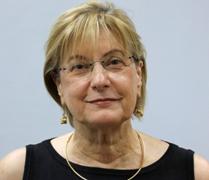Interface Fracture of Homogeneous Materials and Laminates – Theory and Experiment
特邀报告:Interface Fracture of Homogeneous Materials and Laminates – Theory and Experiment
Speaker:Professor Leslie Banks-Sills
主持人:方岱宁 教授
时 间:6月14日(周五)下午2:30-4:00
地 点:力学楼434会议室
Abstract:
Beginning about 20 years ago, the problem of interface fracture mechanics became a focus of study in the Dreszer Fracture Mechanics Laboratory. The first area of interest was that of interface cracking between two homogeneous isotropic materials. To this end, accurate numerical methods (in particular, the conservative interaction energy or M-integral) were implemented to calculate stress intensity factors for an applied load. In addition, this integral was extended to determine stress intensity factors to account for thermal loading. Both of these developments led to the ability to calibrate fracture specimens in order to carry out tests. To this end, the bimaterial Brazilian disk specimen was chosen for study. Two material pairs were investigated: glass/epoxy and two ceramic clays. Testing was carried out to determine the critical interface energy release rate and the mode mixity. Using these results, a failure criterion was determined.
Similar studies were carried out on two laminates: 0°/90° and +45°/-45°. In each of these cases, the first term of the asymptotic expansion of the stress and displacement fields was determined. Both an M-integral for applied and thermal loads was developed. In addition, tests were carried out for both interfaces producing the critical interface energy release rates and mode mixities. Failure criteria were derived.
About the speaker:

Professor Leslie Banks-Sills holds the Diane and Arthur Belfer Chair of Mechanics and Biomechanics at Tel Aviv University since November 2006. She is a Guest Professor at Lund University where she held the Lise Mietner Chair in 2006 and an Adjunct Professor at Cornell University. She serves on the editorial boards of Engineering Fracture Mechanics, International Journal of Fracture, International Journal of Structural Integrity and Strain. She has consulted for various organizations in Israel, as well as for NASA, regarding problems of fracture in structures.
Professor Banks-Sills completed a B.A. degree in mathematics at Queens College of the City University of New York in 1965, an M.Sc. degree in engineering mechanics from the University of Michigan in 1973 and a Ph.D. degree in engineering from Harvard University in 1977. After carrying out a post-doctorate at Brown University, she joined the Faculty of Engineering at Tel Aviv University in 1979. From 1993 through 1997, and again from 2001 through 2005, she served as Chairman of the Department of Mechanics, Materials and Structures. She is Director of the Dreszer Fracture Mechanics Laboratory at Tel Aviv University.
She received the Teaching Excellence Award in Mechanical Engineering, Tel Aviv University (1995-1996), the Teaching Excellence Award, Faculty of Engineering, Tel Aviv University (1998-1999), and the Teaching Commendation Award in Mechanical Engineering, Tel Aviv University (2010-2011). She was elected as an Honorary Fellow of the International Congress of Fracture in 2005 and served on the Executive Board of this organization. The Technion in Haifa awarded her the Hanin Prize for her contributions to aeronautical engineering in 2006. She is the recipient of the 2006 Honorary Membership to ESIS (European Society of Structural Integrity) for her outstanding original technical contributions to fracture mechanics and good service to the international fracture mechanics community. She was elected as a Fellow of the American Academy of Mechanics in 2008. In 2006, she was elected one of two Vice Presidents of ESIS and is currently the President (2010-2014). In addition, she is a Vice President of EURASEM (European Society of Experimental Mechanics) since 2008.
Her research interests include the use of analytical, numerical and experimental methods to treat fracture problems which include homogeneous materials, bonds, interfaces and composites. In particular, recently she and her group have been examining the propagation of cracks in piezoelectric materials, delamination of cross-ply and woven composites and the effect of carbon nano-tubes in polymer materials.
She has participated in over 60 international conferences and been on the scientific committees of many of them. She has guided over 40 Master’s, Ph.D. and post-doctoral students many of whom hold key positions in academia and industry. She has published over 100 papers in international journals and edited the book Advances in Mathematical Modeling and Experimental Methods for Materials and Structures, The Jacob Aboudi Volume, Springer, The Netherlands (2010) with Dr. Rivka Gilat.
